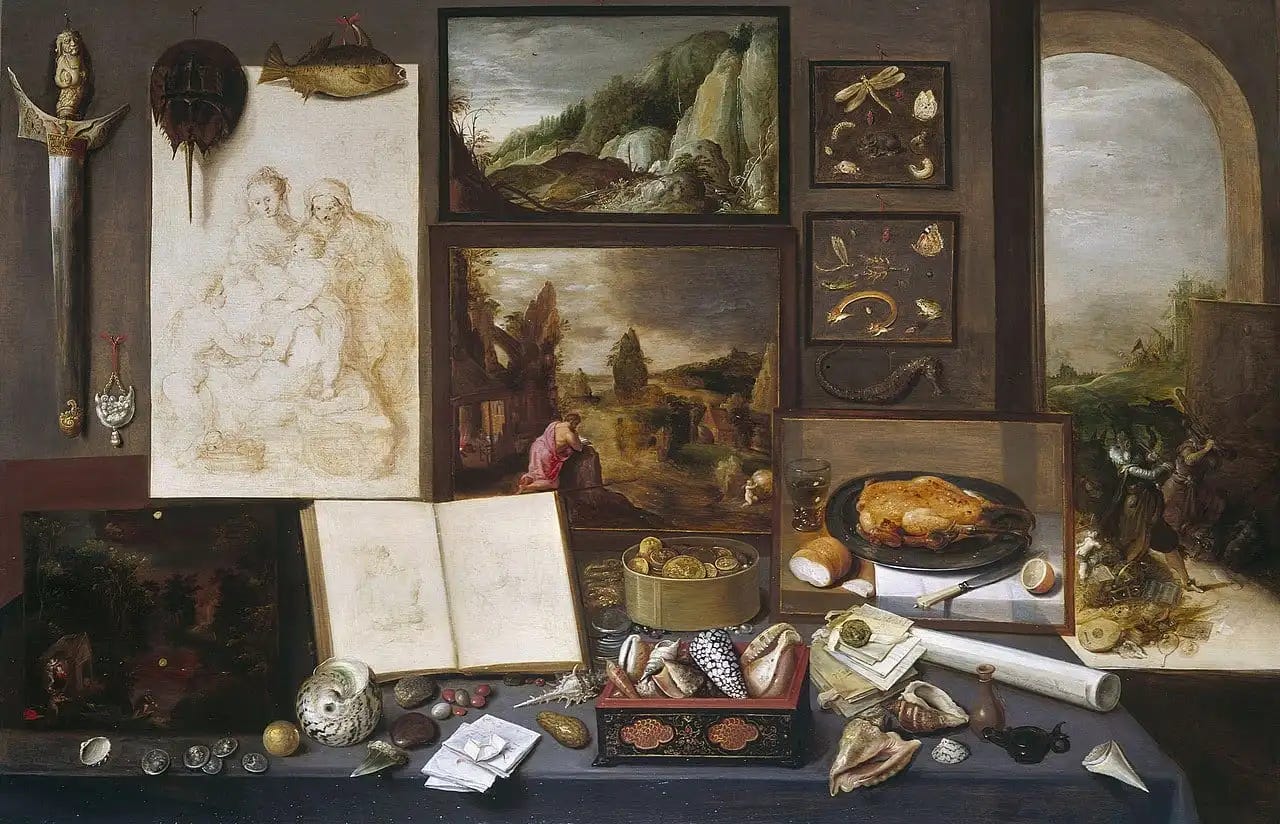
For some time now, I’ve been thinking about a regular topic to write about, like a column. Something that will go nicely with who I am and what my interests are. Last night, while still pondering, I remembered what my friends and family always tell me—that I’m incredibly curious. I guess it goes hand in hand with being an artist. I’ve always been obsessed with the different things that interest me. As a teenager, I was fascinated with Ancient Egypt, specifically the pyramids and pharaohs. I borrowed a kit several times from the local library with a book, DVD, and stamp set to learn hieroglyphics, but I couldn't get enough of it. I continued to watch documentaries on the topic at home. Over the years, my curiosity has led me to explore different topics, objects, experiences, emotions, and even thoughts. I'm always reading, evaluating, analysing, observing, learning, and experiencing. I wrote about "an unhurried life" and my little adventures in the summer about noticing the ordinary things in our life, getting curious about my day-to-day surroundings, and seeing things in a state of newness. I don't think I will ever change. This is just who I am.
I was thinking about cabinets of curiosities last night. I first discovered this concept in
book, "Show Your Work". I was intrigued by the idea of cabinets of curiosities, so much so that I wrote about comparing our creativity to cabinets of curiosities. Basically, from the mid-16th century onwards, collectors began combining and categorising various kinds of art and natural objects in these cabinets, which reflected their worldviews, knowledge and wealth. These cabinets were the precursors to modern museums and were essentially the museums of people's homes. Imagine that you are a member of European royalty and invite some friends over for dinner. During the meal, if you were to run out of conversation topics, you would usually take your guests to your cabinet of curiosities and show them your collection of rare antiquities and exotic natural specimens. The only things that connected these objects were their rarity and the “wow factor.”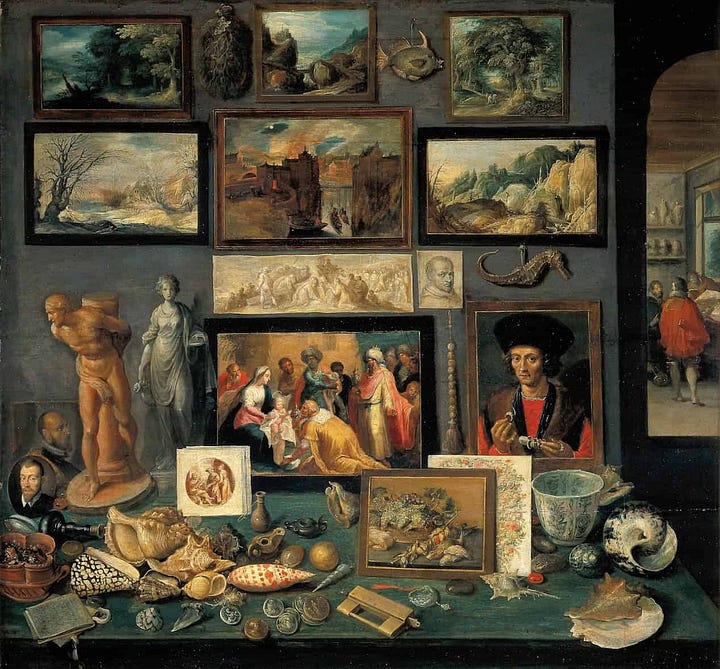
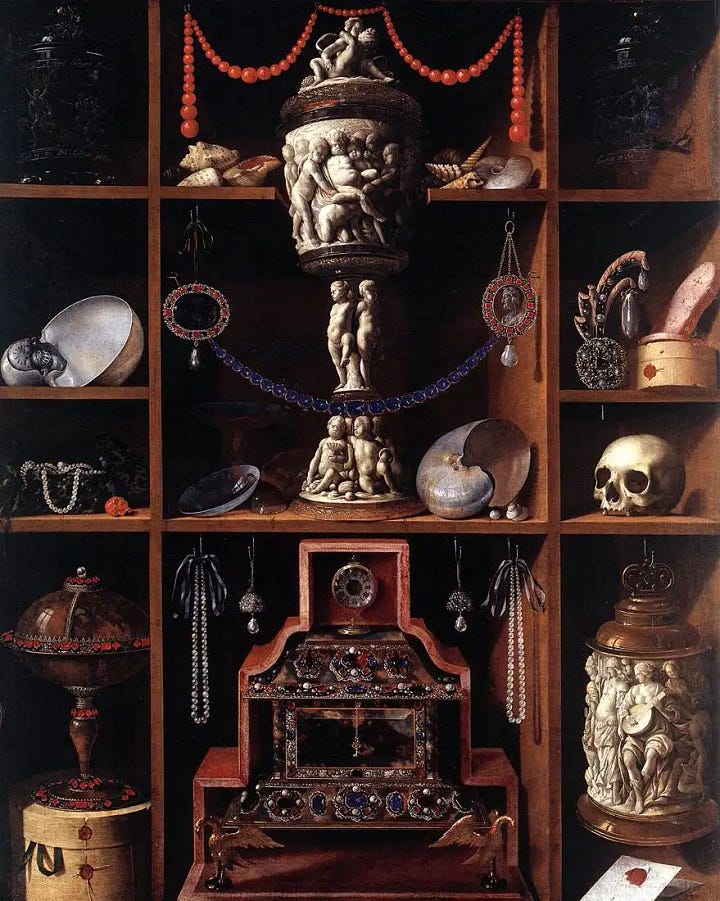
Cabinets of curiosities were no longer in fashion by the 18th century as museums began to grow in popularity. Many renowned European museum collections originated from the cabinets of individual collectors. The world's first public museum is a prime example of this. In 1677, Elias Ashmole presented the University of Oxford with the cabinet of curiosities he had obtained from John Tradescant. The collection featured ancient artifacts, particularly coins, books, engravings, and geological and zoological specimens. The Ashmolean Museum in Oxford, England, opened the following year, providing public access to Tradescant's cabinet for everyone to observe.
Some examples are:
The British Museum originated from the collection of the physician Hans Sloane.
Russia’s first museum, the Kunstkamera in Saint Petersburg, originated from Peter the Great’s cabinet of curiosities.
The Uffizi Gallery in Florence began with the personal collection of Cosimo Medici
The Prado in Madrid grew from Charles III of Spain’s Natural History Cabinet.
Ambras Castle in Austria developed out of the Wunderkammer of Archduke Ferdinand II.
Teylers Museum in Haarlem is based on the collection of Pieter Teyler van der Hulst.
The Deyrolle in Paris started from Jean-Baptiste Deyrolle’s collection.
It is important to consider the means by which European royalties obtained certain objects. In more recent times, some institutions have acknowledged that they acquired these objects through colonialism. Understanding the history behind the acquisition of these objects is essential in gaining a better perspective on why they are in their current locations.
The idea behind "cabinets of curiosities" is still very intriguing, as we all have our own collections of curiosities in life. These collections are not limited to physical things; they can also be experiences, emotions, and topics. Sometimes, it could be a beautiful photo we took, a certain emotion we felt, a thought we had or maybe a lovely flower we saw on the street and became obsessed with. We collect these things in our homes, hearts, minds, and souls. We relive these curiosities by sharing them through stories, art, and various other forms.
The Athens edition is the first edition of my curiosities. These are things that caught my attention, things I obsessed about and stored in my cabinet of curiosities. I'm currently spending two months in Athens, writing my first book in the mornings and attending Greek classes during the day. In my free time, I'm trying to fill my cabinet with beautiful things, experiences, and emotions.
bitter oranges
When I first arrived in Athens, I was delighted to see beautiful trees full of oranges on my street. The sight of them made me smile from ear to ear. It was surprising to find so many orange trees in the middle of the city. Welcome to the Mediterranean, where orange trees grow in a concrete jungle. Brimming with excitement, I shared a photo of them in my family group chat. My dad sent me a voice message explaining that these fruits are called turunç in Turkish. This sparked my curiosity, and I began doing research. These oranges are citrus x aurantium or bitter oranges. They originated in Southeast Asia and spread to the Islamic world via India and Iran as early as 700 C.E. These oranges are too bitter to eat. Nonetheless, they can be used to make marmalades and French bigarade after preparation. The main uses of the bitter orange are for essential oils and perfumes. Whether edible or non-edible, it doesn't matter; these trees lining the streets of Athens are absolutely beautiful. They add a touch of orange colour to a city filled with concrete buildings. I’m forever storing this scenery in my cabinet of curiosities.
orthodox bells
On Sunday morning, as I lay in bed reading, I heard the bells ringing from the neighbouring church - the Holy Church of Saint Dionysius the Areopagite. The sound was so enchanting that I immediately got out of bed and rushed to the balcony to record a snippet. Even after several days, I couldn't stop thinking about the beautiful sound. After some research, I learned that the technique used to ring Orthodox church bells differs from other church bells. I discovered that the bells rung in the Orthodox tradition were sounded exclusively by chiming, which means moving only the clapper to strike the side of a stationary bell and never by swinging the bell. This little moment has been safely stored in my cabinet of curiosities.
bouzouki & childhood
While strolling around Plaka in Athens, I heard a beautiful sound that caught my attention. It was a man playing traditional Greek music on his bouzouki. I’m obsessed with old-school Greek and Turkish music, and listening to this street musician was a pure treat. His music touched me deeply and transported me back to my childhood. I grew up listening to Greek music a lot. My mum sang out loud to us, and, as kids, we used to cover her mouth and tell her to be quiet because it was embarrassing. Now, as an adult, I cherish those moments so much. When I close my eyes, I see my mum dancing and singing while cleaning the house. I never realised how I stored these memories, but now they keep rising to the surface, filling my heart and soul with joy.
I would love to hear about some of your curiosities! If you're interested in reading more of my work, kindly consider subscribing to my free newsletter. You won't receive spam; it's only my sincere passion for writing and life!
Also, if you have a Substack publication and enjoy my writing, I would greatly appreciate it if you could add my publication to your list of recommendations.
Thank you for your support!
Take care!
Your friend
Tuğba
Recent posts:

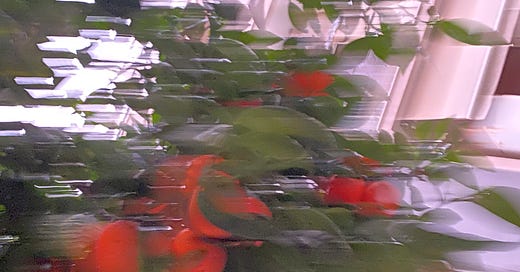


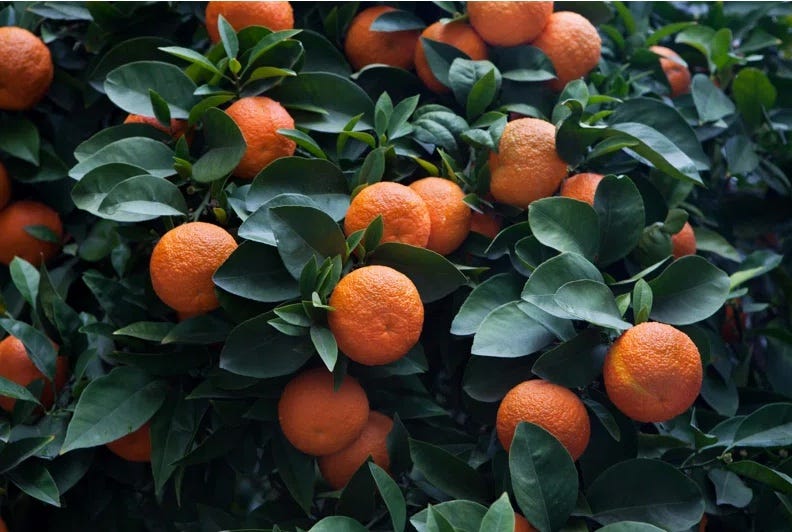

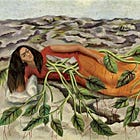

Oh Tuğba, this was so delicious to read ! Aside from your writing, I love that I always learn something reading your pieces. I too enjoy the concept of cabinet de curiosités (sorry had to show off my french 😆), but the ones I came accross as a child were filled mainly with old insects and bones, which really put me off at the time.
I like how you are using this concept and it opened up my mind to it again.
Have a lovely sunday x
I miss the oranges and the bells. Thank you.